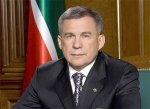
Moscow Faces Hard Choices in Tatarstan and Wider Volga Region
By:

On September 20, the Tatar youth activist organization Azatlyk staged a protest in Kazan, the capital of Tatarstan. The activists countered the demands of Tatarstan’s Russian population to drop the Tatar language from the curriculum of the republic’s public schools. The leader of Azatlyk, Nail Nabiullin, told the Regnum news agency that the Tatar activists did not want a repeat of the Bashkir scenario in Tatarstan. Bashkortostan President Rustem Khamitov had stated that the republic was lifting its requirement for all public schoolchildren in the republic to learn Bashkir. Ethnic Russians in Tatarstan hoped the authorities in Kazan would follow Ufa’s lead in abolishing compulsory instruction in the region’s languages. However, on September 13, Tatarstan President Rustem Minnikhanov confirmed in an address to the parliament that the Tatar language would remain compulsory in all public schools, regardless of the ethnicity of the schoolchildren. Russian observers allege that the Tatar police did not interfere with Azatlyk’s demonstration, while they violently dispersed ethnic Russian protests against teaching the Tatar language in public schools (https://www.regnum.ru/news/fd-volga/tatarstan/1573656.html).
Although much attention has been paid to separatism in the North Caucasus, Tatarstan and Bashkortostan won far more significant concessions from Moscow without reverting to open confrontation. This is partly explained by the economic and political weight these two republics have. Their territories are major industrial and transportation hubs in the Russian Federation. Ethnic Tatars, numbering 5.5 million people, are the second largest ethnic group in Russia after ethnic Russians. There are also 1.6 million Bashkirs. Due to the windfall of high oil prices and the overall high level of development of the two republics, both are financially self-sufficient and not overly dependent on Moscow.
In Tatarstan, there are over 2 million ethnic Tatars, who comprise more than 54 percent of the republic’s population of 3.8 million. Ethnic Russians make up 40 percent of Tatarstan’s population. Unlike Tatarstan, ethnic Bashkirs make up only 30 percent of Bashkortostan’s total population of 4 million, while Russians make up over 36 percent. There is also a sizeable Tatar minority in Bashkortostan: Tatars make up more than 25 percent of Bashkortostan’s total population (Russian State Statistical Service, www.gks.ru). Because the Tatars comprise a clear majority in Tatarstan, they evidently feel much more confident in implementing legislation supporting their native language than the Bashkirs in Bashkortostan.
Since the attacks on Tatarstan’s official Muslim leaders in July, Tatar nationalists may have acquired additional leverage against Moscow. In the July attacks, Tatarstan’s mufti, Ildus Faizov, narrowly survived an attempt on his life, while his deputy, Valiulla Yakupov, was killed. Moscow would probably rather deal with Tatar nationalists than with Islamic radicals in Tatarstan. This essentially means that Tatar nationalists would likely receive leeway for much broader social action than they had previously. In the wake of the attacks in the republic, which had previously been thought of as being free of Islamic radicals, Tatarstan’s establishment has been trying to regain that status, promoting tolerance among the various currents of Islam in the republic. “In Kazan, a Wahhabi (aka Salafi) may easily be a guest at a Sufi’s house,” Muslim activist Nail Mukhammedov said at a government sponsored roundtable in Kazan. “Among Tajiks, for instance, such a situation is absolutely impossible” (https://www.regnum.ru/news/fd-volga/tatarstan/1575103.html).
In the meantime, there has been a 20 percent increase in the inflow of migrants from other countries into Tatarstan in 2012 and many of the migrants come from Central Asia. Out of over 110,000 registered foreigners in the republic, nearly 35,000 come from Uzbekistan, while 10,000 come from Tajikistan. Most of the influx is caused by Tatarstan’s booming economy. In addition, the Tatar language is remotely related to Turkic and Tatarstan is a Muslim republic, which probably attracts Central Asians to the republic (https://www.regnum.ru/news/fd-volga/tatarstan/1575726.html).
Iran’s interest in Tatarstan is reportedly increasing. Russian observers point out that when Moscow offered Tehran a second consulate in Russia, the Iranians opened it in Kazan in 2007, even though most of the Shi’ites in Russia, for the most part ethnic Azeris and Tajiks, live in St. Petersburg and Yekaterinburg. Apart from the Iranian Embassy in Moscow, Tehran has another consulate in Astrakhan, a Russian port city on the northern Caspian Sea coast. Five hundred Iranian students are expected to pursue studies in Kazan. Tatar expert Rais Suleimanov expressed concern that the security services would not be able to keep an eye on all incoming foreigners (https://www.apn.ru/publications/article27220.htm). The rationale for Moscow’s benevolence toward the Iranian presence in the Russian Volga region might be that the government hopes Iranian Shi’ites will undermine the spread of Salafi ideology. However, the policy could backfire, given that the interaction between Shi’ite and Sunni radicals could have unpredictable results.
The Tatar intelligentsia has been tirelessly seeking to thwart the threat of “Russification” of the Tatars. In the 1990s, separatist ideas were popular in the republic, while ethnic Russians came under some pressure. Today, when Russia has practically ceased to be a federation and ethnic minorities are under strong pressure from Moscow, Tatar scholars have come up with the idea of building up Tatar communities in Tatarstan and beyond from below. The plan is apparently designed to circumvent pressure by the Russian state apparatus, which is vigilantly on guard for manifestations of non-Russian nationalism (https://www.ng.ru/columnist/2012-09-20/5_tatary.html).
Although Tatarstan’s political leverage in negotiations with Moscow greatly declined by the beginning of 2000s, the republic still has traces of vibrant nationalist movements. The novelty of the situation is that if Moscow now chooses to suppress Tatar nationalism further, it could face rising Islamic radicalism in the region. What happens in Tatarstan and the wider Volga region will depend on whether the Russian government would take the threat of Islamic radicalism seriously and soften its stance on Tatar nationalism, or it would rely on crude force and try to suppress all dissent.




